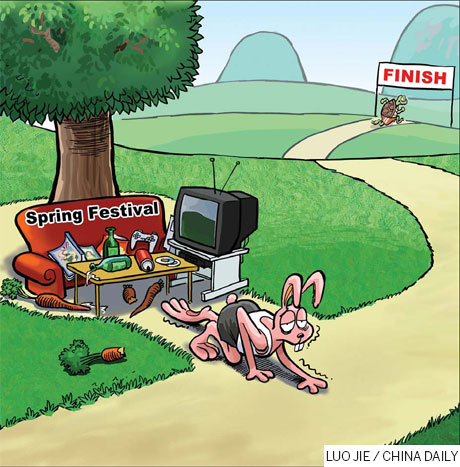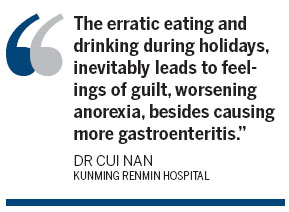More than the blues

As the Spring Festival celebrations end, many Chinese are finding it a struggle to cope with a return to regular life. Li Lianxing reports.
As the Lantern Festival looms, officially marking the end of the fortnight-long lunar new year celebrations, many Chinese are struggling to shake off the holiday mood. Qian Jiale, an engineer with a Beijing construction company, says he is finding it challenging to concentrate on his daily routine and finds he can't fall asleep until late at night.
"It feels really awkward," says the 26-year-old, who spent the Spring Festival in his hometown of Wuxi, in East China's Jiangsu province.
The sudden shift from festive to work mode is known to cause pain and unease, both physical and mental. Dubbed "post-festival syndrome" it may cause anorexia, depression, anxiety, or even nervous exhaustion, says Dr Li Li of PKU Boss Psychology Center in Beijing.
The Spring Festival marks the nation's longest holiday period and is a time of travel, partying, shopping and family reunions.
This year has seen a record 2.85 billion passenger trips taken nationwide, in what has been termed the world's largest annual human migration.
Feeling sad and depressed when all this intense activity comes to a sudden halt, is normal and natural, according to Li.
Qian says he spent most of his holiday with his family, talking and playing until very late. He also sat up most nights catching up on his DVD watching.
"My life was turned upside down," he says.

His case is not unique, Li says, adding that for the stay-at-home elderly folks, it's even worse as they have to suddenly cope with a silent, lonely home after the hustle and bustle of family and friends.
Children, too, find they can't focus on schoolwork after all the excitement from the fireworks and other festivities.
People's physical health, too, takes a battering during the festival.
Dr Cui Nan with Kunming Renmin Hospital, in Kunming, Yunnan province, says the erratic eating and drinking during holidays, inevitably leads to feelings of guilt, worsening anorexia, besides causing more gastroenteritis. He says the hospital has seen a spike in festival-induced gastro-intestinal infections.
"This makes it even more difficult to return to routine life."
Li of PKU, likening the post-festival syndrome to the application of brakes suddenly in a car, says people feel vulnerable at such a time and this may lead them to magnify negative feelings.
Wang Fan, who works at a Beijing headhunting company, is a nervous wreck.
"I've still not found the two candidates I was supposed to for my clients by my deadline as I did nothing during the holidays," Wang says. "The more I think of this, the more nervous I am, and the less I can eat or sleep."
While feeling the blues after a period of celebration, such as Christmas, or even a relaxing weekend getaway, is not all that uncommon, the Spring Festival break makes it worse.
For millions of young urbanites, and many more migrant workers, it is the first real holiday of the year and the only time they will get together with their families, living thousands of miles away.
All the pent-up nostalgia spills over during the festival and breaking away, once again, from the warmth of home and hearth can be a disheartening experience for many.
Pang Xuegang, 54, and his wife Meng Fengqin, from Heze city, Shandong province, wait eagerly for this time of the year when the whole family gets together.
They treasure the few days they get to enjoy of the company of their 31-year-old daughter Pang Hongmin who lives in Shijiazhuang, Hebei province, and their son Pang Hongbin, who works in Beijing.
Their 28-year-old son says, "I can hardly do anything these days and can't concentrate on my business."
"Even though we parted just two days ago, I already miss my parents and my brother so much," Pang Hongmin says.
Although battling the syndrome can be tricky, there are ways to avoid the post-festival blues.
A "transitional period" is crucial, Li says.
Spending the last one or two days of the holidays reflecting quietly on the work ahead, often works.
This is the time to plan for the new year, bring everyday routines back on track and keep regular times. The whole idea is to synchronize your emotions.
Li Wei and Wang Xin, doctors at Peking University First Hospital, say while they have seen some cases of people suffering from the after-effects of excessive eating and drinking during the festival, most of those with depression may just be trying to wait it out and warn against it.
Among their remedies for a safe return to life post-festival are relaxing massages, hot showers and a regular sport.
They also suggest cutting down on meat and including more fruits and vegetables in the diet.
(China Daily 02/16/2011 page19)


















